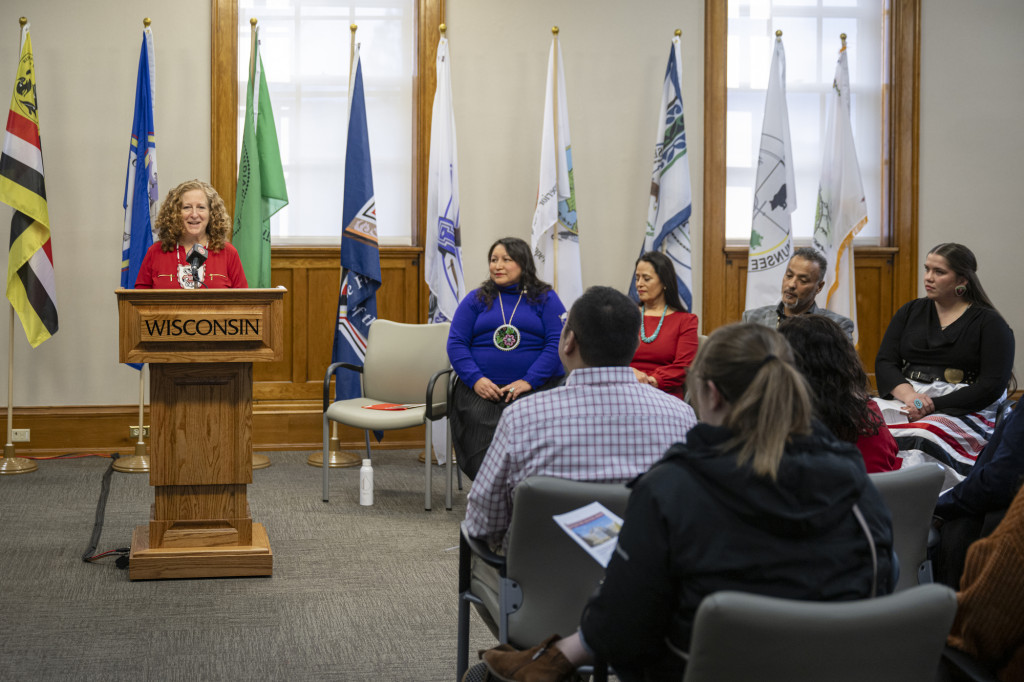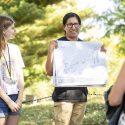UW–Madison to cover full cost of undergraduate degree for students from Wisconsin Indian tribes

On Dec. 18, Chancellor Jennifer Mnookin speaks at a press conference in Bascom Hall to announce the Wisconsin Tribal Educational Promise program. Seated, from left, are Carla Vigue, director of tribal relations for UW–Madison; Shannon Holsey, president of the Stockbridge-Munsee Band of Mohican Indians and chairwoman of the Great Lakes Inter-Tribal Council; Jon Greendeer, president of Ho-Chunk Nation; and Kalista Memengwaa Cadotte, UW student and member of Lac Courte Oreilles Band of Lake Superior Ojibwe. Photo: Bryce Richter
Beginning in the fall of 2024, the University of Wisconsin–Madison will offer financial support to cover the full cost of pursuing an undergraduate degree for Wisconsin residents who are enrolled members of federally recognized Wisconsin Indian tribes, Chancellor Jennifer L. Mnookin announced today.
The commitment covers not only tuition and fees but also housing, meals, books and other educational expenses.
Additionally, a 5-year pilot program will cover in-state tuition and fees for students pursuing a J.D. (law) or M.D. (medical) degree who are Wisconsin residents and enrolled members of federally recognized Wisconsin tribes.
Together, the two new initiatives will be called the Wisconsin Tribal Educational Promise program. The program does not rely on taxpayer funding; rather, it’s supported by other institutional resources, such as private donations.
“As a university, we are deeply committed to a future of mutual respect and cooperation with the American Indian tribes in Wisconsin,” Mnookin says. “This program is another tangible, meaningful step in that direction.”
As university leaders developed the initiatives over the past year, they consulted with the Great Lakes Inter-Tribal Council, a consortium that includes the tribal chairperson or president of each of the 11 federally recognized American Indian tribes in Wisconsin. Mnookin met with council members three times to discuss the proposed program, and changes were made based on those conversations. In October, the council unanimously voted to support the Wisconsin Tribal Educational Promise program.
“The creation of this program marks a significant step in the partnership between the American Indian tribes in Wisconsin and the University of Wisconsin–Madison,” says Shannon Holsey, president of the Stockbridge-Munsee Band of Mohican Indians and chairwoman of the Great Lakes Inter-Tribal Council. “While several other states have programs with similar goals, we are not aware of another effort that goes this far financially to help Native students afford higher education. This program sends a strong message that our students are important to the state’s flagship university.”
Mnookin says the feedback from tribal leaders and Native students was invaluable in designing the program.
“One tribal leader shared how he slept in his car while attending college. Another said they couldn’t afford meals. Native students have shared that they can’t even consider a study abroad experience or an unpaid internship because of the financial impacts,” Mnookin says. “That’s why it is so important that we include the full cost of attendance for undergraduates. We are setting these students up for success academically, but also, just as importantly, the program means that Native students will have full access to all that UW–Madison offers.”
The Wisconsin Tribal Educational Promise program is not based on financial need; financial support will be awarded regardless of family income. When it begins next fall, the program will cover those already on campus, not just those new to campus. Any currently enrolled students at that time who qualify — undergraduates, J.D. students and M.D. students — will receive the program’s financial support.
For undergraduates, the program will provide a pathway to a debt-free education. It will provide sufficient financial support, after other scholarships and grants, to meet the estimated cost of attendance, which includes not only tuition and fees but also housing, meals, books and other educational expenses. The university updates its expected cost of attendance annually. The undergraduate cost currently for a Wisconsin resident is $28,916 annually.
The program will provide four years of support for students who enter as freshmen and two years of support for students who enter as transfer students.
For professional students pursuing a J.D. or M.D. degree, the pilot program will cover the cost of in-state tuition and fees. (Books and living expenses are not included.) Currently, for J.D. students, tuition and fees total $35,197 annually; for M.D. students, it is $42,198 annually.
For J.D. students, the program will cover resident tuition for full-time students for three academic years; for M.D. students, the program will cover four years. The program will start in the fall of 2024.
To be eligible for either of the initiatives, a student must be:
- A Wisconsin resident
- Verified as an enrolled member of any one of the 11 federally recognized American Indian Tribes in Wisconsin
- Enrolled at UW–Madison for their first undergraduate degree or for a J.D. or M.D. degree
“At the heart of the Native community is the support and care we have for one another and that we make decisions that will benefit not just ourselves but also the next seven generations,” says Carla Vigue, UW–Madison director of tribal relations. “It is our hope that more Native students will take a second look at UW–Madison and realize that we are not out of reach. And I want Native students to know that, once here, we have support and services that can help them thrive and feel a real sense of belonging at this world-class university.”
Since 2016, a Native Nations working group at UW–Madison has sought to create educational networks, respectful research relationships and culturally responsive engagement programs with the Native nations of Wisconsin. In 2019, the university installed the Our Shared Future heritage marker on Bascom Hill, pledging a shared future of collaboration and innovation with the Ho-Chunk Nation, on whose ancestral land the university sits.
Subscribe to Wisconsin Ideas
Want more stories of the Wisconsin Idea in action? Sign-up for our monthly e-newsletter highlighting how Badgers are taking their education and research beyond the boundaries of the classroom to improve lives.



